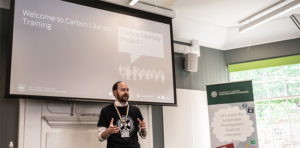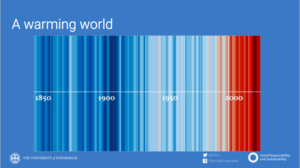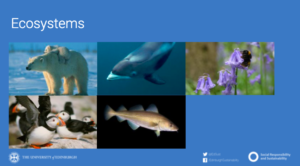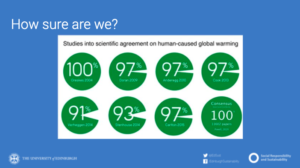What is carbon literacy and why does it matter?

University of Edinburgh MSc in Environmental Sustainability alumna, Naoise Luke, tells us how she found our new learning and development opportunity: Carbon Literacy Training.
Basic literacy – which has enabled me to write the following article and you to (hopefully!) read it – is a universally understood concept. It is considered to be the foundation of formal education and a symbol of advanced society. Increasing literacy rates is therefore a policy priority of governments the world over, with unprecedented levels of funding devoted over the past half-century to successfully increase global adult literacy rates from 65% in 1977 to 86% in 2018 (World Bank, 2019). However, the relatively novel concept of carbon literacy remains unfamiliar to many, if not most, members of the public. It is defined as:
An awareness of the carbon costs and impacts of everyday activities and the ability and motivation to reduce emissions, on an individual, community and organisational basis
Carbon Literacy Project (2020) What On Earth is Carbon Literacy?
 In fact, despite having just completed a Masters in Environmental Sustainability at the University of Edinburgh – with carbon emissions and impacts at the core of the curricula – I myself had never come across the concept until I was offered the opportunity to take part in the University’s inaugural Carbon Literacy Training just last month.
In fact, despite having just completed a Masters in Environmental Sustainability at the University of Edinburgh – with carbon emissions and impacts at the core of the curricula – I myself had never come across the concept until I was offered the opportunity to take part in the University’s inaugural Carbon Literacy Training just last month.
However, having completed the training – which involved six hours of remote instruction and discussion, as well as the completion of a short reflective assignment – I have now been accredited as ‘carbon literate’ by the Carbon Literacy Trust.
The Carbon Literacy Project is a UK-based charity which aims to educate and empower trainees to reduce their personal carbon footprints as well as effect broader change in reducing carbon emissions across the UK.
Though I am inarguably biased due to my academic background in sustainability, I strongly believe that carbon literacy is a skill which is only increasing in relevance in the context of the current climate crisis. I am of the opinion that it should be recognised as an essential element of education at all levels, and formally integrated into school and university curricula.
In the meantime, I strongly recommend – for the reasons outlined below – that if you can participate in Carbon Literacy Training at the University of Edinburgh, you should seize the chance.
Back to basics
 Firstly, the Carbon Literacy Training offered by the University (which is organised by the Department for Social Responsibility and Sustainability) strikes the perfect balance of being accessible for all without being condescendingly oversimplified. As climate change and carbon emissions increasingly dominate public discussion and become household terms, it is easy to assume that we are all now au fait with such concepts.
Firstly, the Carbon Literacy Training offered by the University (which is organised by the Department for Social Responsibility and Sustainability) strikes the perfect balance of being accessible for all without being condescendingly oversimplified. As climate change and carbon emissions increasingly dominate public discussion and become household terms, it is easy to assume that we are all now au fait with such concepts.
In Carbon Literacy Training there are no such assumptions, with the course offering a rare opportunity to get to grips with what exactly climate change means, and just why it is so important.
Indeed, because the course truly gets back to basics with regard to climate change and carbon, no prior scientific knowledge is required to participate in Carbon Literacy Training. Moreover, for my colleagues who possessed a relatively extensive knowledge of environmental issues, the training was an invaluable refresher course; helping to revise and reinforce prior learning.
There were three of us participating in the training who had just completed an MSc in Environmental Sustainability, and we each agreed that the training usefully served to concisely summarise our studies over the past twelve months. In short, the only prerequisite for participation in Carbon Literacy Training is a desire to learn (more) about the incredibly important concept of climate change – with beginners and experts alike able to benefit from the experience.
Collaboration and conversation
 In addition, Carbon Literacy Training offers a precious opportunity in these strange socially distanced times – to (remotely) engage with and learn from like-minded students and staff members. The way in which the course allowed us to convene and converse with other participants was one of the most enjoyable elements of the whole experience.
In addition, Carbon Literacy Training offers a precious opportunity in these strange socially distanced times – to (remotely) engage with and learn from like-minded students and staff members. The way in which the course allowed us to convene and converse with other participants was one of the most enjoyable elements of the whole experience.
Engaging with other participants is an inimitable aspect of the learning process. In fact, it is no insult to the instructors but instead a compliment to my colleagues to say that a significant proportion of what I learned during the training was during informal – and insightful – conversations with fellow participants.
The course organisers facilitated these by organising ‘breakout rooms’ via the online Collaborate platform, which allowed small groups of us to discuss various topics (e.g. the carbon footprint of the contents of our fridge) and offer personal insights. In a post-pandemic context, Carbon Literacy Training will be offered in-person, but as a remote course, it is impressively interactive.
As staff and students face an unprecedented period of remote studying and working where we might miss opportunities to engage with colleagues, Carbon Literacy Training offers a low-pressure environment in which there is ample space for collaboration and peer-to-peer learning.
Empowerment through education
 Finally, the Carbon Literacy course pulls off a tricky balancing act by relaying the stark reality of the climate crisis without frightening participants into climate change apathy. The infectiously passionate instructors managed to foster an atmosphere of positive realism, whereby myself and my colleagues were made to feel empowered through education to reduce our individual carbon footprints, and hopefully to also facilitate broader emissions reductions.
Finally, the Carbon Literacy course pulls off a tricky balancing act by relaying the stark reality of the climate crisis without frightening participants into climate change apathy. The infectiously passionate instructors managed to foster an atmosphere of positive realism, whereby myself and my colleagues were made to feel empowered through education to reduce our individual carbon footprints, and hopefully to also facilitate broader emissions reductions.
All too often climate change messaging is – understandably – distressing, with Sir David Attenborough’s hard-hitting documentary Extinction (released September 2020) being a prime example.
However, in my opinion, the communication of scientific evidence must be done in such a way as to foster a sense of hope, in order to successfully motivate behaviour change and prevent public resistance to engaging with the issue. The course never shied away from the actuality of global climate change, but also emphasised the many ways in which we could – both collectively and as individuals – effect positive change and ultimately reduce carbon emissions.
In this way, Carbon Literacy Training successfully serves to energise (rather than enervate) participants to create the changes we so critically need to see.
Register your interest for the Carbon Literacy Training
- Sign up for Carbon Literacy Training
- Find out about more training opportunities for students
- Find out about more training opportunities for staff
Open to University of Edinburgh staff and students.





Hi,
My name is Chloe and I work at The Carbon Literacy Project, so pleased that you enjoyed and found your training so valuable! We love your article and would hugely appreciate it if you would grant us permission to reblog this on our blog (https://carbonliteracy.com/blog/) and other comms channels. Please let me know if you would be happy for us to do so, my email is chloe@carbonliteracy.com.
All the best,
Chloe
Helping people understand the fundamental principles of carbon and climate breakdown is crucial. But if the emphasis is primarily on individual actions that people can take to reduce their personal carbon footprint, then there is a danger of diverting attention away from the structural changes that urgently need to happen: divesting finance from fossil fuels, and reinvesting in renewable energy generation, plus reforestation and soil regeneration to draw down and lock up atmospheric carbon.
With students, I campaigned for my university to divest from fossil fuels. In November 2015, it publicly pledged to divest its endowments of £3.9 million from fossil fuels. But despite repeated written requests, no evidence has ever been provided that the divestment happened. More recently, a staff and student Climate Assembly was forbidden from discussing fossil fuel divestment. In this context, compelling staff to undergo Carbon Literacy training seems questionable.
HI David. Carbon Literacy does have a focus on individual actions, but also recognises the global, national and local contexts and actions by governments, sectors and organisations, and how individuals can influence change. You can find out more here: https://carbonliteracy.com/